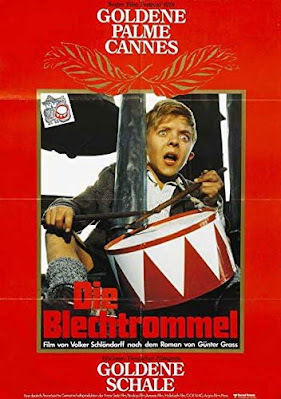Beating a Tin Drum

Decades ago, on assignmentfrom the Hollywood Reporter, I wrote an article on child actors who wererequired to perform in very adult situations. I came away disturbed butfascinated by parents who allowed—or even encouraged—their kids to play rolesthat involved heavy doses of sex or violence. The parents, and the kids themselves, all insisted that there had beenno harm done, but a child psychologist I interviewed wasn’t so sure that theyoungsters ultimately came away unscathed.
So you can imagine howcurious I am about Daniel Bennent. The Swiss-born actor is 58 now, andapparently doing fine. But he was a mere 11 when he starred in VolkerSchlöndorff’s bold 1979 adaptation of a tragicomic German anti-warnovel, Günter Grass's The Tin Drum. The film(distributed in the U.S. by Roger Corman) shared the Palme d’Or at Cannes with ApocalypseNow, and went on to win the 1980 Academy Award for best foreign language feature.
Bennent, the child of actors,apparently got the plum leading role because of a medical condition that stuntedhis growth at an early ago. Oskar, the boy he plays, has made the eccentricchoice not to grow any taller once he’s reached the age of three. So at 11 andat 16 and at 19, he’s still got the look of a very young boy. It’s not just his height that’s distinctive: he has asolemn face marked by an intense blue-eyed stare that keeps the audienceriveted. And then there’s the toy drum (a gift from his sensual and eccentricmother) that’s his constant companion, something he turns to at moments of highemotion, rapping out his feelings with two wooden sticks. (He also depends on ashriek that can literally shatter glass.) In the course of the film, though his body stays the same, his spiritdefinitely evolves, leading him to discover lust and ultimately sorrow.
Oskar and his family live inDanzig, an independent coastal city that’s a blend of German and Polishinfluences. It’s the 1930s, and Nazi ideology is definitely on the rise. Insome ways it divides his household, which is an unusual one. Mother Agnes seemsto split her attentions (sexual and otherwise) between her shopkeeper-husbandand the male cousin who shares Oskar’s bright blue eyes and is quite probablyhis biological parent. The two dad-figures are on opposite sides of the town’spolitical and ethnic divide, and ultimately both face tragic fates, with Oskaralways sensing that he’s a slight bit responsible.
Following the loss of hismother and both father-figures, Oskar is drawn less to political ideology thanto the simple need to survive. Which is how he ends up in a circus actfeaturing a cynical band of what we might call munchkins, all of them far olderthan he but not much taller. They perform for Nazi troopers who greet themgleefully, but they find their happiness (not to mention sexual gratification)within their own ranks. This is not to be the end, though, of Oskar’s odysseythrough wartime Europe. He winds up back where he started, finally making thecurious decision to start growing once again.
The cinematography of TheTin Drum is often distinctive, and the European cast is strong. I want tosingle out Charles Aznavour, knownworldwide as a French singer/songwriter of Armenian descent. He was also alifelong supporter of human rights. In The Tin Drum he has the small butvital role of a kindly Jewish toy-shop owner who (of course) meets a sad fate,and he’s not easily forgotten.
Beverly in Movieland
- Beverly Gray's profile
- 10 followers



